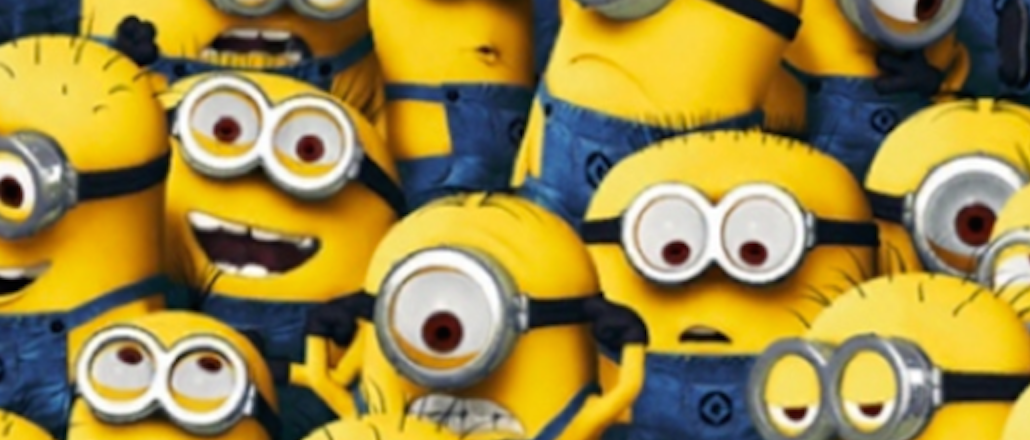Save 50% on a 3-month Digiday+ membership. Ends Dec 5.

It’s the Minions’ world, and we’re just living in it.
Everywhere you turn, those silly yellow pill-shaped creatures are peering back at you behind their thick goggles. It’s part of an arguably diabolical promotional plan from Illumination Entertainment to promote “Minions,” a prequel to the “Despicable Me” franchise, out Friday. And, indeed, the saturation is bordering on, well, despicable.
From Happy Meals at McDonald’s to a takeover of NBC’s “Today” show, the promotional efforts have been relentless and exhaustive. Deadline reports that it’s Universal’s biggest promotional campaign ever that leaves nothing, whether it’s Tic Tacs, the front page of the Los Angeles Times or Amazon boxes, untouched.
So, why have brands succumbed to Minion mania?
Scott Thompson, a designer at Brand Union, described their “silly, naïve and somewhat devious” personality and rounded appearances as a major reason why. “Minions are undeniably adorable, with big eyes and a squat, rounded body that calls to mind a small child or baby,” he told Digiday.
They’re approachable and non-threatening but also “uniquely adaptable” for brands, he said. Minions are being used to pitch food that resembles them, like Twinkies and Kraft Macaroni and Cheese or slapped on Amazon boxes and even have their own Pantone color.

Ad position: web_incontent_pos1
Companies aren’t afraid to attach themselves to the characters because they reach all age groups and cultures. “Minions are a perfect specimen for this world,” said Thompson because of their gibberish language (“Minionese”) and expressive behavior doesn’t need translation. (Troubling for McDonald’s, though, is that the toy Minions that have been coming with Happy Meals utter a phrase that sounds alarming like “what the fuck” to some parents — a claim the restaurant chain denies, but, let’s be honest, would be on-brand for the little devils.)
Rachel Spiegelman, the president of Pitch, echoed that sentiment. “In a time when every product is doing anything it can to stand out, using the visual language of the Minion’s gives a sense of elevation and importance to the brand that customers recognize in an instant.”

Minion mania, however, is taking a toll. Brandwatch measures that 40.5 percent of tweets about minions are negative, meaning there’s a brewing backlash.
For example:
i have an equal hate for minions and paradise by coldplay
— ! shania ! (@Icdsoundsystem) July 9, 2015
Ad position: web_incontent_pos2
I HATE MINIONS STOP RETWEETIN THEM ONTO MY TIMELINE. I HATE THOSE POTATO SHAPED DEMONS. THEYRE SO ANNOYIN. IF I SEE ONE MORE IM LOGGING OUT.
— mollie (@forgotocallyou) July 5, 2015
I HATE MINIONS I HATE MINIONS TAKE THOSE YELLOW CAPITALISTIC LOOKING TWINKIES AWAY FROM ME I HATE MINIONS I HATE THEM SO MUCH
— joy kudia (@kudya_not) July 1, 2015
This stupid Minions advertising has gone too far pic.twitter.com/hdVapBH5hB
— Thorin Klosowski (@kingthor) July 10, 2015
Despite those haters, 59.5 percent of tweets have been positive and humongous. There were 222,000 mentions of minions on Wednesday night alone. Buzz like that is building for a favorable opening weekend at the box office, as some estimates project it will blow past $110 million.
With the today’s release, we can expect the mania to subside for now — at least until the next movie is released.
Featured image via Wikia.
More in Marketing

Ulta, Best Buy and Adidas dominate AI holiday shopping mentions
The brands that are seeing the biggest boost from this shift in consumer behavior are some of the biggest retailers.

U.K. retailer Boots leads brand efforts to invest in ad creative’s data layer
For media dollars to make an impact, brands need ad creative that actually hits. More CMOs are investing in pre- and post-flight measurement.
Ad position: web_bfu